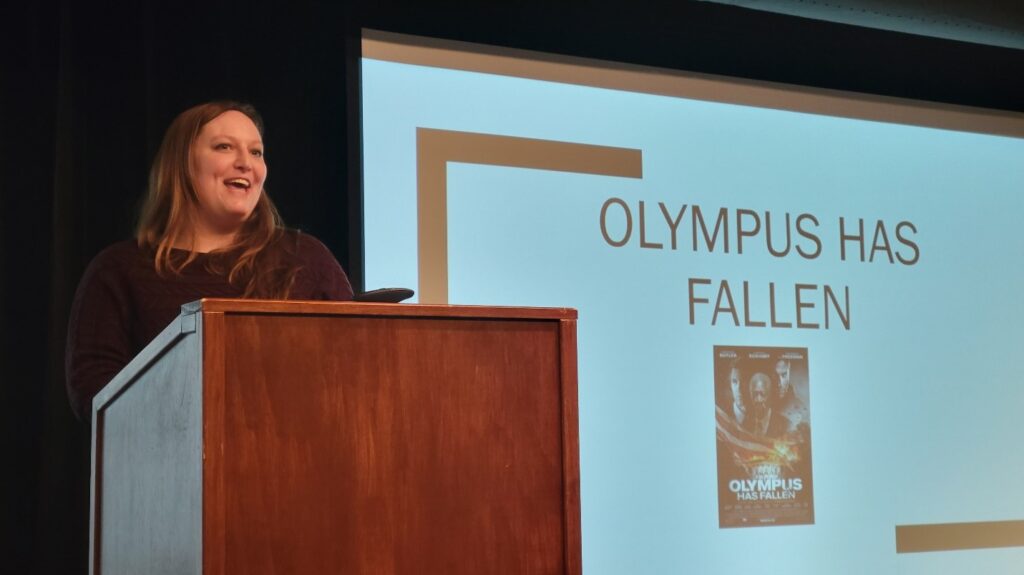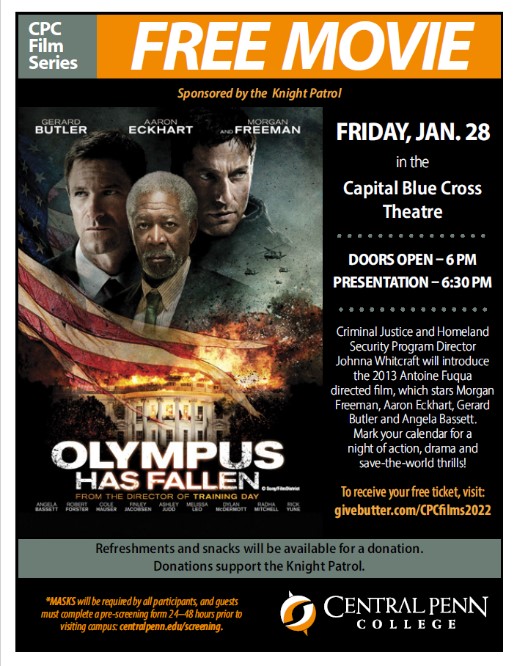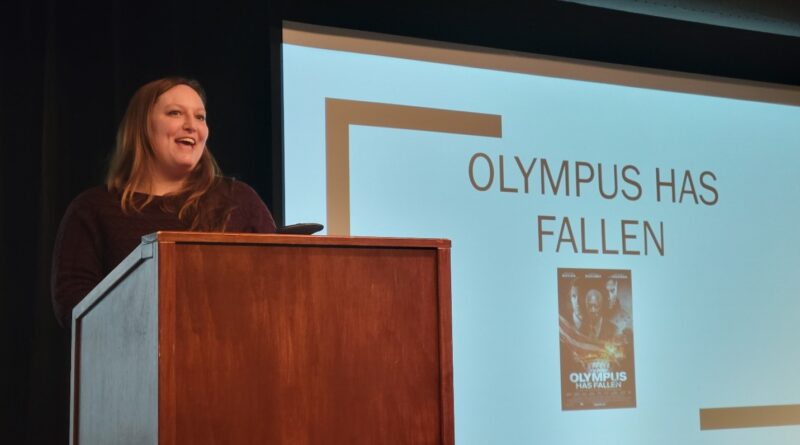Remember the difference between real heroes and movie stars
Central Penn professor sets record straight on the Secret Service in movies and in real life

By Dylan Bowman
Knightly News Reporter
dylan.bowman@mymail.centralpenn.edu
Following fall term’s CPC Film Series showing of the comedy “Robin Hood: Men in Tights,” the series took a dramatic and action-packed turn, focusing on the depiction of law enforcement, particularly, the U.S. Secret Service.
This term’s presenter? Director of the Criminal Justice and Homeland Security Program Johnna Whitcraft. As it was her first time presenting in the CPC Film Series, she looked forward to sharing one of her favorite films with the campus: “Olympus Has Fallen.”
Real life and the movies
Whitcraft’s desire to share the 2013 film with Central Penn stemmed from deep personal connections with her family, most notably her father, who would watch movies with her “that were probably not appropriate for a child,” but had “historical perspective to them,” including “Braveheart” and “The Patriot.”
In fact, Whitcraft’s favorite film genre is historical action, which she grew up watching.

“I like any genre of movie,” Whitcraft stated, “but action is definitely my favorite.”
When asked why she chose to present “Olympus Has Fallen,” Whitcraft explained her reasoning.
“I was going between this movie and ‘Tombstone,’ my all-time favorite. I think ‘Olympus Has Fallen’ is very interesting; I just love the way Gerard Butler plays the main character and I love that this isn’t how Secret Service agents act in real life.”
Whitcraft continued: “I like the idea that if something bad happens, there’s this person who can just come in and fix everything, but he’s not a superhero – he’s just an ordinary guy.”
From counterfeit busters to president protectors
Whitcraft’s presentation dove into the real Secret Service, covering its origins and fun facts about the agency, often unknown to many.
According to Whitcraft, the Secret Service was established in 1865 after the Civil War under the Department of the Treasury. Originally, the service did not protect the president or any other person of importance. Instead, its main objective was to stamp out rampant counterfeiting operations at the time, which were so serious after the war that around one-third of U.S. currency was counterfeit.
After the assassination of President McKinley, in 1901, Congress informally requested that the Secret Service provide presidential protection as its top priority. In 1902, the Secret Service assumed full responsibility for the protection of the president, transforming the agency into the entity of agents we are familiar with today.
Still, Whitcraft mentioned in her presentation that real Secret Service agents are seldom the action heroes donning dark sunglasses and an earpiece that we often see in the movies.
“There are some cases where those dark sunglasses protect their eyes from projectiles and they allow them to scan a crowd undetected,” Whitcraft said, “but most of the time they are just protecting their eyes from the sun.”
In addition, only two Secret Service agents have died in the line of duty while protecting a president.
In 1902, agent William Craig died in an accident in Pittsfield, Massachusetts, when a trolley hit the horse-drawn carriage in which he and President Theodore Roosevelt were traveling with other public officials.
In 1950, President Harry Truman was residing in the Blair House while the White House was undergoing renovations across the street. On Nov. 1, two would-be assassins, Oscar Collazo and Griselio Torresola, approached the Blair House, intent on killing Truman. They opened fire on Secret Service agent Leslie Coffelt and other White House officers. Though mortally wounded by three bullets to the chest and abdomen, Coffelt returned fire, killing Torresola and wounding Collazo, successfully protecting the president from harm.
On March 1, 2003, the Secret Service was transferred from the Department of the Treasury to the Department of Homeland Security.
Today, there are 7,000 people in the Secret Service worldwide, fighting terrorism and counterfeit schemes. Though they may not always wear the dark sunglasses, they still have a lot to be famous for.
Dimming of the lights

After Whitcraft’s presentation, the BlueCross Theatre grew quiet. The first shot of the film could easily bring a tear to the eye of sentimental viewers, such as this reporter:
Trumpets blowing as the American flag waved in the breeze.
Ah, what a sight to behold.
The film itself is packed with action as Gerard Butler’s character, Secret Service agent Mike Banning, tries to rescue the president from terrorists who have taken the White House. The story has a good chance of raising your pulse and moving your posterior closer to the edge of wherever you happen to be sitting.
“Olympus Has Fallen” was a box office success, grossing $170.2 million worldwide against a budget of $70 million. It is the first film in a trilogy, with “London Has Fallen” (2016) and “Angel Has Fallen” (2019). Butler and producer Alan Siegel recently confirmed that three more films are in the works for the “Fallen” saga.
The feature includes several familiar faces during its 119-minute run, including Butler (“300” and “How To Train Your Dragon”), Aaron Eckhart (“The Dark Knight”), Angela Bassett (“Black Panther”), Rick Yune (“Die Another Day”) and Morgan Freeman (“The Dark Knight” and “Million Dollar Baby”).
Central Penn has risen
The Central Penn showing of “Olympus Has Fallen” drew a crowd of about 35. Many of the viewers stated after the showing that it was “intense” and “really, really good,” displaying what seems to be a desire on campus for action-packed films to be shown. The good news is that there never seems to be a shortage of heart-racing stories that can be presented to the public.
“I just want everyone to take away from this film that there is a difference between real life and the movies,” Whitcraft said. “At the end of the day, every law enforcement officer is real and wants to go home to their family. … I think that’s something we forget sometimes with these movies, that law enforcement and police officers are real-life people.”
Comments or story ideas? Contact KnightlyEditors@CentralPenn.Edu.
Edited by media-club co-adviser and blog editor Professor Michael Lear-Olimpi.



